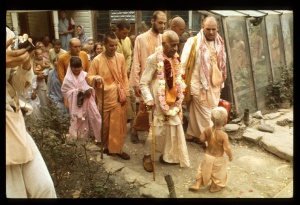SB 12.12.42-43: Difference between revisions
m (1 revision(s)) |
(Vanibot #0054 edit - transform synonyms into clickable links, which search similar occurrences) |
||
| (One intermediate revision by one other user not shown) | |||
| Line 1: | Line 1: | ||
{{info | {{info | ||
|speaker= | |speaker=Sūta Gosvāmī | ||
|listener=Sages of | |listener=Sages of Naimiṣāraṇya | ||
}} | }} | ||
[[Category:Srimad-Bhagavatam - Canto 12 Chapter 12]] | |||
[[Category:Bhagavatam Verses Spoken by Suta Gosvami - Vanisource|121242]] | |||
<div style="float:left">'''[[Srimad-Bhagavatam]] - [[SB 12|Twelfth Canto]] - [[SB 12.12: The Topics of Srimad-Bhagavatam Summarized|Chapter 12: The Topics of Śrīmad-Bhāgavatam Summarized]]'''</div> | |||
<div style="float:right">[[File:Go-previous.png|link=SB 12.12.40-41]] '''[[SB 12.12.40-41]] - [[SB 12.12.44]]''' [[File:Go-next.png|link=SB 12.12.44]]</div> | |||
{{RandomImage}} | |||
{{SBnotice}} | |||
==== TEXTS 42-43 ==== | ==== TEXTS 42-43 ==== | ||
<div | <div class="verse"> | ||
vipra-śāpāpadeśena | :vipra-śāpāpadeśena | ||
saṁhāraḥ sva-kulasya ca | :saṁhāraḥ sva-kulasya ca | ||
uddhavasya ca saṁvādo | :uddhavasya ca saṁvādo | ||
vasudevasya cādbhutaḥ | :vasudevasya cādbhutaḥ | ||
yatrātma-vidyā hy akhilā | |||
proktā dharma-vinirṇayaḥ | :yatrātma-vidyā hy akhilā | ||
tato martya-parityāga | :proktā dharma-vinirṇayaḥ | ||
ātma-yogānubhāvataḥ | :tato martya-parityāga | ||
:ātma-yogānubhāvataḥ | |||
</div> | </div> | ||
| Line 21: | Line 27: | ||
==== SYNONYMS ==== | ==== SYNONYMS ==== | ||
<div | <div class="synonyms"> | ||
vipra- | ''[//vanipedia.org/wiki/Special:VaniSearch?s=vipra&tab=syno_o&ds=1 vipra]-[//vanipedia.org/wiki/Special:VaniSearch?s=śāpa&tab=syno_o&ds=1 śāpa]'' — of the curse by the ''brāhmaṇas''; ''[//vanipedia.org/wiki/Special:VaniSearch?s=apadeśena&tab=syno_o&ds=1 apadeśena]'' — on the pretext; ''[//vanipedia.org/wiki/Special:VaniSearch?s=saṁhāraḥ&tab=syno_o&ds=1 saṁhāraḥ]'' — the withdrawal; ''[//vanipedia.org/wiki/Special:VaniSearch?s=sva&tab=syno_o&ds=1 sva]-[//vanipedia.org/wiki/Special:VaniSearch?s=kulasya&tab=syno_o&ds=1 kulasya]'' — of His own family; ''[//vanipedia.org/wiki/Special:VaniSearch?s=ca&tab=syno_o&ds=1 ca]'' — and; ''[//vanipedia.org/wiki/Special:VaniSearch?s=uddhavasya&tab=syno_o&ds=1 uddhavasya]'' — with Uddhava; ''[//vanipedia.org/wiki/Special:VaniSearch?s=ca&tab=syno_o&ds=1 ca]'' — and; ''[//vanipedia.org/wiki/Special:VaniSearch?s=saṁvādaḥ&tab=syno_o&ds=1 saṁvādaḥ]'' — the discussion; ''[//vanipedia.org/wiki/Special:VaniSearch?s=vasudevasya&tab=syno_o&ds=1 vasudevasya]'' — of Vasudeva (with Nārada); ''[//vanipedia.org/wiki/Special:VaniSearch?s=ca&tab=syno_o&ds=1 ca]'' — and; ''[//vanipedia.org/wiki/Special:VaniSearch?s=adbhutaḥ&tab=syno_o&ds=1 adbhutaḥ]'' — wonderful; ''[//vanipedia.org/wiki/Special:VaniSearch?s=yatra&tab=syno_o&ds=1 yatra]'' — in which; ''[//vanipedia.org/wiki/Special:VaniSearch?s=ātma&tab=syno_o&ds=1 ātma]-[//vanipedia.org/wiki/Special:VaniSearch?s=vidyā&tab=syno_o&ds=1 vidyā]'' — the science of the self; ''[//vanipedia.org/wiki/Special:VaniSearch?s=hi&tab=syno_o&ds=1 hi]'' — indeed; ''[//vanipedia.org/wiki/Special:VaniSearch?s=akhilā&tab=syno_o&ds=1 akhilā]'' — completely; ''[//vanipedia.org/wiki/Special:VaniSearch?s=proktā&tab=syno_o&ds=1 proktā]'' — was spoken; ''[//vanipedia.org/wiki/Special:VaniSearch?s=dharma&tab=syno_o&ds=1 dharma]-[//vanipedia.org/wiki/Special:VaniSearch?s=vinirṇayaḥ&tab=syno_o&ds=1 vinirṇayaḥ]'' — the ascertainment of the principles of religion; ''[//vanipedia.org/wiki/Special:VaniSearch?s=tataḥ&tab=syno_o&ds=1 tataḥ]'' — then; ''[//vanipedia.org/wiki/Special:VaniSearch?s=martya&tab=syno_o&ds=1 martya]'' — of the mortal world; ''[//vanipedia.org/wiki/Special:VaniSearch?s=parityāgaḥ&tab=syno_o&ds=1 parityāgaḥ]'' — the giving up; ''[//vanipedia.org/wiki/Special:VaniSearch?s=ātma&tab=syno_o&ds=1 ātma]-[//vanipedia.org/wiki/Special:VaniSearch?s=yoga&tab=syno_o&ds=1 yoga]'' — of His personal mystic power; ''[//vanipedia.org/wiki/Special:VaniSearch?s=anubhāvataḥ&tab=syno_o&ds=1 anubhāvataḥ]'' — on the strength. | ||
</div> | </div> | ||
{{SBcollapse}} | |||
==== TRANSLATION ==== | ==== TRANSLATION ==== | ||
<div | <div class="translation"> | ||
How the Lord withdrew His own dynasty on the pretext of the brāhmaṇas' curse; Vasudeva's conversation with Nārada; the extraordinary conversation between Uddhava and Kṛṣṇa, which reveals the science of the self in complete detail and elucidates the religious principles of human society; and then how Lord Kṛṣṇa gave up this mortal world by His own mystic power—the Bhāgavatam narrates all these events. | How the Lord withdrew His own dynasty on the pretext of the brāhmaṇas' curse; Vasudeva's conversation with Nārada; the extraordinary conversation between Uddhava and Kṛṣṇa, which reveals the science of the self in complete detail and elucidates the religious principles of human society; and then how Lord Kṛṣṇa gave up this mortal world by His own mystic power—the Bhāgavatam narrates all these events. | ||
</div> | </div> | ||
__NOTOC__ | </div> | ||
</div> | |||
<div style="float:right">[[File:Go-previous.png|link=SB 12.12.40-41]] '''[[SB 12.12.40-41]] - [[SB 12.12.44]]''' [[File:Go-next.png|link=SB 12.12.44]]</div> | |||
__NOTOC__ | |||
__NOEDITSECTION__ | |||
Latest revision as of 20:59, 17 February 2024

A.C. Bhaktivedanta Swami Prabhupada
Please note: The synonyms, translation and purport of this verse were composed by disciples of Śrīla Prabhupāda
TEXTS 42-43
- vipra-śāpāpadeśena
- saṁhāraḥ sva-kulasya ca
- uddhavasya ca saṁvādo
- vasudevasya cādbhutaḥ
- yatrātma-vidyā hy akhilā
- proktā dharma-vinirṇayaḥ
- tato martya-parityāga
- ātma-yogānubhāvataḥ
SYNONYMS
vipra-śāpa — of the curse by the brāhmaṇas; apadeśena — on the pretext; saṁhāraḥ — the withdrawal; sva-kulasya — of His own family; ca — and; uddhavasya — with Uddhava; ca — and; saṁvādaḥ — the discussion; vasudevasya — of Vasudeva (with Nārada); ca — and; adbhutaḥ — wonderful; yatra — in which; ātma-vidyā — the science of the self; hi — indeed; akhilā — completely; proktā — was spoken; dharma-vinirṇayaḥ — the ascertainment of the principles of religion; tataḥ — then; martya — of the mortal world; parityāgaḥ — the giving up; ātma-yoga — of His personal mystic power; anubhāvataḥ — on the strength.
Translation and purport composed by disciples of Śrīla Prabhupāda
TRANSLATION
How the Lord withdrew His own dynasty on the pretext of the brāhmaṇas' curse; Vasudeva's conversation with Nārada; the extraordinary conversation between Uddhava and Kṛṣṇa, which reveals the science of the self in complete detail and elucidates the religious principles of human society; and then how Lord Kṛṣṇa gave up this mortal world by His own mystic power—the Bhāgavatam narrates all these events.